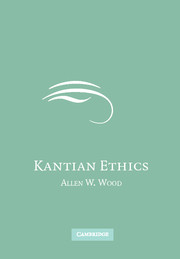5 - Humanity
Published online by Cambridge University Press: 05 June 2012
Summary
In Kantian ethics, the fundamental value is humanity or rational nature as an end in itself. This value grounds the supreme principle of morality from the side of its matter and results in the moral law's second formulation (FH). In the most complete or universal formula of the moral law, FA, this value is developed into the ground of moral legislation itself, in the form of the dignity of rational nature as universally legislative. This chapter tries to explain the nature of this fundamental value and look at Kant's defense of the claim that rational nature has such a value. It concludes with a discussion of the possibly controversial moral status of some human beings or forms of human life, and of nonhuman animals.
What Is an End in Itself?
An existent or “self-standing” end. Rational nature is described as an end – an end in itself. Kant calls it a “self-sufficient,” “independent,” or “self-standing” (selbständig) end, in contrast to an “end to be produced” (G 4:437). It is an end in the sense of something for the sake of which we act. This is not a technical or “funny” sense of ‘end’. It is simply the most basic and encompassing sense of the word. Rational nature is not an end, however, in another (more derivative) sense in which Kant also thinks that every action must have an end.
- Type
- Chapter
- Information
- Kantian Ethics , pp. 85 - 105Publisher: Cambridge University PressPrint publication year: 2007



